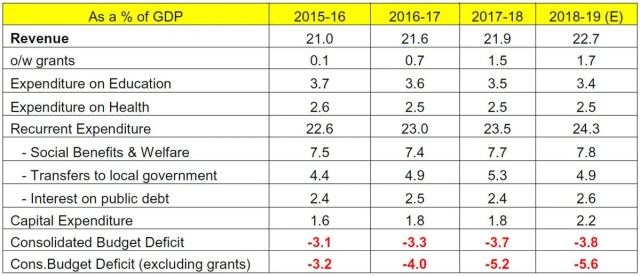Living beyond our means
Economic Outlook
By Rattan Khushiram

Nobody owes a living, and most of the goodies that have been served by this regime -tertiary education, negative income tax, minimum wage, generous wage and PRB awards, increase in basic pension, etc., have an impact on the budget and the economy. They have a cost. Can we afford them? Are we not jeopardising our future by such fiscal largesse – if not irresponsibility?
From Table 1, we can see the impact of these measures on some of the fiscal aggregates. Consolidated Budget deficit, inclusive of Special Funds, has been quite high for the past three years. Exclusive of grants, the deficits are even more serious, a result of the irresponsible social largesse of the present regime generating significant threats to fiscal soundness and sustainability.
Table I: Evolution of the main Fiscal Aggregates

Revenue, exclusive of grants, has stayed broadly around 21% of GDP. We cannot continue to rely on grants to implement our broad development agenda. Our taxation system relies too heavily on taxation of goods and services while imposing a low taxation on other sources of income. No serious effort has been made to find alternative sources of revenue like improving the progressivity of the tax system, hiking the taxes on the Smart Cities and Property Development Schemes, the taxing of wealth or the divestiture of public assets in the short-term. The diversification of our revenue sources has to become a priority now in order to provide the required public resources to finance our broad development agenda.
Recurrent expenditure is budgeted to rise to 24.3% of GDP in 2018/19 propelled by the growth in social spending. Expenditure on untargeted social benefits and welfare is already taking a huge chunk of our recurrent expenditure at around 8% of GDP despite promises during the electoral campaign to meet the cost of the increase in basic pension through a reduction in wastage and unproductive recurrent expenditures. Instead, they have been slashing capital spending to contain total expenditures and public debt. This reorientation of the budget, where a very large portion of it is actually going towards recurrent expenditure at the cost of public investment, is impacting negatively on the growth rate, in the reduction of unemployment and in alleviating poverty.
The expansionary budgetary stance is not sustainable. We have to stop distributing goodies; we cannot afford such social largesse like the generous wage awards, “free” tertiary education, rising basic pension or generous PRB awards because, sooner or later, the illusion that such government spending spree can be sustained will eventually be shattered.
Moreover, the fiscal environment in which government operates will become increasingly challenging in the future, with looming large expenditures in government liabilities (i.e. pension and health) and a large development program to build human and productive physical capital. We are already spending too little on education and health.
Thus this government should be carrying out the crucial reforms necessary for improving fiscal efficiency and enabling the restoration of fiscal space which would be key to support the country’s goal to reach high-income status in the medium term. Instead of leveraging our advantages to usher in novel structural reforms and new pillars of growth, they are squandering the momentous opportunity to get the economy going again on a more sustainable trajectory and hence secure our collective future. What is even more serious is that they are wasting so many years of hard work and discipline and of fiscal consolidation through their populist policies.
The current government is indebting this country without preparing it to meet the challenges ahead. It’s the height of irresponsibility reflecting a scorched-earth policy to satisfy one’s electoral ambitions. This is tantamount to an act of irresponsibility towards the country and its future generations. “In the long run we are all dead; so why sacrifice a present benefit that can give us an electoral advantage for a doubtful advantage in the future?” Is that’s their logic?
* Published in print edition on 18 January 2019
An Appeal
Dear Reader
65 years ago Mauritius Times was founded with a resolve to fight for justice and fairness and the advancement of the public good. It has never deviated from this principle no matter how daunting the challenges and how costly the price it has had to pay at different times of our history.
With print journalism struggling to keep afloat due to falling advertising revenues and the wide availability of free sources of information, it is crucially important for the Mauritius Times to survive and prosper. We can only continue doing it with the support of our readers.
The best way you can support our efforts is to take a subscription or by making a recurring donation through a Standing Order to our non-profit Foundation.
Thank you.

